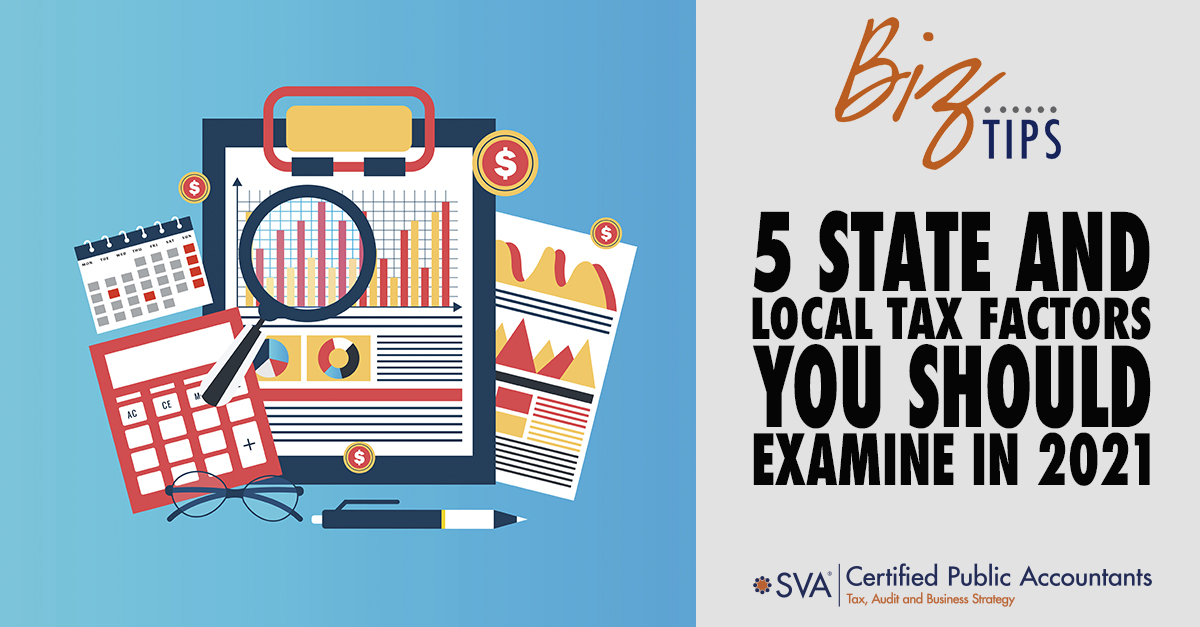After the economic troubles of the COVID-19 pandemic and the extensive effort to keep our society functioning, is it any wonder that governments are trying to find new options to stimulate economies, get people back to work, and keep businesses open?
This process is creating pressure for more tax revenue, specifically state and local taxes (SALT). To address these issues, states are revising their rules and policies for taxpayer compliance and considering new tax options for digital services.
Are you aware of recent changes in SALT issues impacting your business?
Whether you're in one location or your enterprise crosses state or local borders, even in a virtual manner, staying on top of new issues should be an important part of your tax liability planning. Here’s a look at some top issues you should monitor in 2021 to avoid bigger problems down the road.
Tax Factors Your Business Needs to Consider
1. Pass-Through Entity (PTE) Income Taxes
The Trump-era Tax Cuts and Jobs Act passed in 2017 established a $10,000 cap on deducting SALT from federal taxes, and it doesn’t look like that cap is going anywhere anytime soon. That being said, more and more states are now allowing S corporations and partnerships to be taxed at entity levels so that their state resident owners are able to work around the SALT camp.
Even so, there may be broad, long-term applications to choosing these tax elections. Some of the state tax traps, especially those for nonresidents, require care to avoid situations that can exceed the tax savings your company will see at the federal level.
2. Federal Income Tax Change Issues
Changes to federal tax legislation can also impact state taxes. Though many states need to decide if they will conform with federal legislation or decouple from it, some states have made no changes, leaving it to the taxpayers to file state returns with little help about how federal tax changes will impact those taxes.
As tax years impacted by the Tax Cuts and Jobs Act are headed into audit cycles, taxpayers that didn’t consider federal changes when filing state taxes may not only have to face an audit but also refund options if they overpaid. Review your state tax returns to find options for reducing exposure and finding refunds ahead of audits.
3. Digital Advertising Services Taxes
Though it won’t go into effect until at least 2022, Maryland is the first state to enact a digital advertising services tax, and other states have introduced similar taxes or are considering doing so to add these services to their sales tax base. Following the current lawsuits by several large tech companies against Maryland for this action can help you guess how your state may go in its own legislation to tax these vital services.
This is especially important given the very broad definition for digital advertising services as well as the specific facts that your state may bring into its legislation. Understanding the variety of state proposals and setting up a strategy for dealing with these taxes’ potential impact can make a huge difference for your business.
4. Remote Sellers/Marketplaces: Sales and Use Taxes
The rules for remote sellers and marketplaces are becoming much easier to follow, as evidenced by Missouri being the only holdout state against clearly defined virtual economic standards or marketplace rules. (Florida and Kansas have joined the rest of the states with an economic threshold for remote retailers and marketplace platforms.) However, have you considered your business's physical presence?
Though economic nexus rules apply to virtual operations, traditional physical presence regulations are still in effect. States are still assessing companies that have some type of physical presence in their state, so be aware of whether your business falls under these regulations and make sure you're in compliance with each state’s sales and use tax laws or marketplace facilitator regulations by taking all planning opportunities available.
5. Personal and Real Estate Property Taxes
Because property tax assessments often fall behind the fair market value, it’s easy to end up with an assessment on your equipment, vehicles, real estate, or other property that doesn’t reflect the reality of the situation. If your property is being assessed too high as compared to the fair market value of that property, you can appeal the assessment.
However, if you’re not certain of the value of your property, working with a valuation expert can help you not only determine if the assessment is accurate but also provide documentation for future equipment donations, insurance claims, and similar situations.
Start Preparing Your Business Today
These issues can be difficult to navigate, but that doesn’t mean you need to spend hours poring over the regulations to figure out where your business falls. If you have any questions or need help staying in compliance with changes in SALT laws, please contact SVA today.

© CPA ContentPlus 2021

